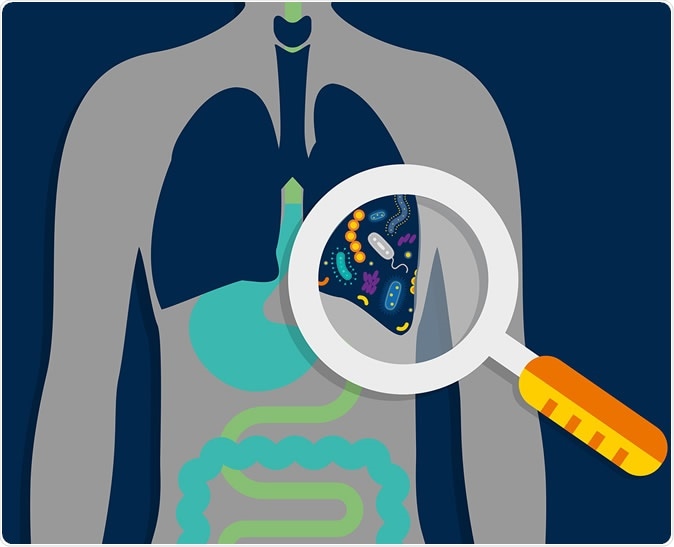
Changes in the lung microbiome may help predict how well critically ill patients will respond to care, according to new research published online in the American Thoracic Society's American Journal of Respiratory and Critical Care Medicine. Image Credit: Michigan Medicine
What is already known?
The same team earlier found that patients who develop acute respiratory distress syndrome, or ARDS, which is a serious condition associated with often-fatal lung inflammation and flooding with excessive fluid, have highly variable immune function. They also found that the shift of gut bacteria into the lungs may contribute to its development. Another study showed that a study of the lung microbiome in patients who have idiopathic pulmonary fibrosis (IPF) is also helpful in predicting the clinical outcome.
Formerly, people considered the lungs to be a sterile environment, but advanced techniques to look for bacteria in the lungs based on DNA detection have proved that there are constantly changing and adapting bacterial communities of many different types in the lungs.
When the person is very ill, the lung bacterial composition changes again, because of the alteration in the lung immune defences. This is already established knowledge.
The study
The researchers looked at the types of lung bacteria in 91 patients who were critically ill, to evaluate their relationship with the eventual outcome of care. They measured the level of bacteria, the types of bacteria in the lungs, and the typical location of these bacteria. They also counted the number of days off the ventilator.
The findings
The study shows that there is a strong association between the lung microbiome in terms of the level of bacteria and the presence of gut bacteria in the lungs, with the number of days the patient spends off the ventilator.
In particular, the higher the numbers of bacteria in the lung on the day after admission to the intensive care unit (ICU), the lower are the number of ventilator-free days. This finding remained robust and did not change after adjusting for the gravity of the illness or for whether the patient had pneumonia or not. This was in spite of the fact that pneumonia automatically implies a greater number of bacteria in the lungs.
In addition, when the types of bacteria in the lung were also identified, it helped to offer a more accurate prognosis of the outcomes following ICU care of the patient. If two bacteria more commonly found in the gut, namely, Lachnospiraceae and Enterobacteriaceae, were found in the lungs on culture, the outcome was generally worse.
Thirdly, if Enterobacteriaceae were found to be present in the lungs, the patient was likely to have ARDS.
Implications
Robert Dickson, the study’s lead author, explains, “What the current study tells us is that this disruption of lung microbiota is clinically meaningful. In otherwise similar patients, differences in lung bacteria help explain who recovers and who doesn't.”
The study of the lung microbiome in this patient set may thus identify a new focus in the prevention and treatment of serious illness. This is because the lung microbiome can potentially be changed by medical intervention, whereas many other factors in the case of critically ill patients cannot – such as their genetic potential or the type of underlying illnesses they already have.
Dickson explains, “Predicting ICU outcomes is important, but what we really want is a target for therapy. We need to figure out if the lung microbiome is something we can modify, either to prevent lung injury or to help it resolve faster.”
And in the case of ARDS, say the investigators, the study establishes that different patients have vastly different findings. Says senior author Lieuwe Bos, “Knowing that immune function and the microbiome differ among these patients may not only help us predict our patients' outcomes but to change them for the better.”
The future
The researchers acknowledge that more research is needed to validate the results, because they did not control for some confounding factors such as prior antibiotic use before ICU admission. Moreover, they could not say for certain whether the gut-associated bacteria in the lungs of some of these patients actually originated in the gut and migrated to the lungs, or whether they arrived there because of aspiration by the patient (the accidental movement of food, liquid or stomach contents into the airway), which is also a common phenomenon in very ill patients.
The scientists want to try and change the lung microbiomes and observe whether this produces any effect on the outcome of these patients. They must perform both human prospective trials and animal studies to model critically ill subjects in whom lung microbiota manipulations must be performed.
Pulmonary specialist James Kiley calls the study one more bit in the growing pile of evidence that the lung microbiome is intimately linked to lung disease. He ends, “It's important that we continue to explore the microbiome and other factors that contribute to lung disease and clinical outcomes.”
Journal reference:
Lung microbiota predict clinical outcomes in critically ill patients, Robert P. Dickson, Marcus J. Schultz , Tom van der Poll , Laura R. Schouten , Nicole R. Falkowski , Jenna E. Luth , Michael W. Sjoding, Christopher A. Brown , Rishi Chanderraj , Gary B. Huffnagle, Lieuwe D. J. Bos, https://www.thoracic.org/about/newsroom/press-releases/resources/pdf-releases/microbiota-and-critical-illness.pdf